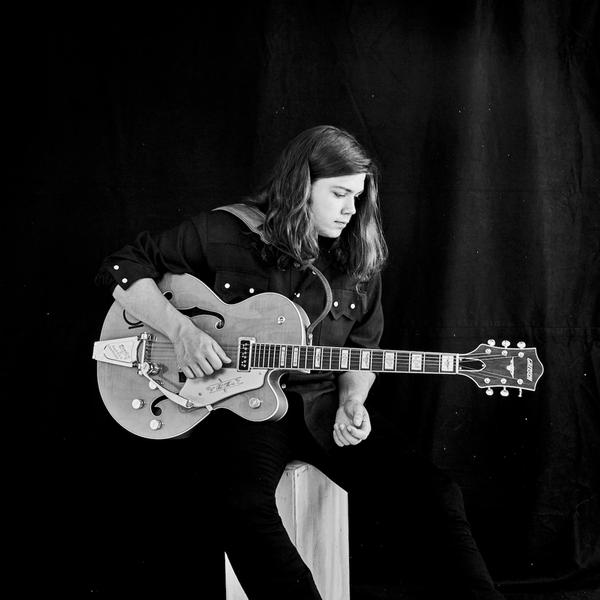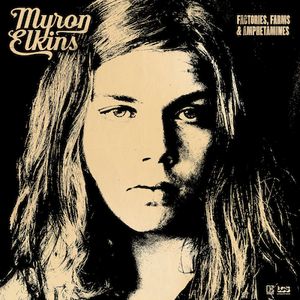




Link copied

There are voices that just come out of nowhere, that somehow feel both instantly familiar and like nothing you’ve ever heard before. Myron Elkins has that kind of voice. A timeless soul singer who sounds like a cross between Bobby Charles and Sam Cooke, with a voice so earthy you can practically hear the worms crawling in it.
With songs like ‘Wrong Side of the River’ and ‘Hands to Myself’, Elkins places the country soul coming up from Memphis and Muscle Shoals at its foundation, but also takes in more than a little of the blues-based Southern rock of the Allman Brothers and Lynyrd Skynyrd. It’s lively and excitable and impossible to resist. Chris Stapleton might have kicked down the doors of the country rock mainstream, but it’s Myron Elkins that’s coming bouncing on through.
Unbelievably, for a singer who sounds so natural and effortless, the 21-year-old never set out to become a full-time musician. After graduating from high school, the then 17-year-old became a welder in his hometown of Otsego, Michigan and had every intention of making that his career. However, fate had other plans.
Three years ago, a relative signed him up for a battle of the bands at a local venue, despite the fact Elkins' only prior experience with live music was playing at church and a few bars in the small Michigan town where he grew up. With just three weeks' notice, Elkins put a band together featuring three of his cousins and a friend and the experience opened his eyes to a very different career path.
Now, at 21 years old, he’s poised to become one of country's most intriguing new artists with the release of his Dave Cobb-produced debut album, Factories, Farms & Amphetamines, via Elektra/Low Country Sound. Across the album’s 10 tracks, Elkins crafts sharply poetic observations informed by his working-class upbringing, infusing his music with his own unique take on the world.
“I actually wrote a lot of these songs on the album in my head while I was welding," he says. “I just loved to play and write all of the time. Finding people who want to do that with you isn’t always easy, but we made it work. And with this bunch of songs, it made it all worth it.”
After that fateful battle of the bands (which, ironically, Elkins and his band didn’t end up winning), they practised almost every day for three years straight in between working long hours at their respective day jobs.
“We’d get together around seven o’clock at the practice barn, and we’d play until after midnight," Elkins says. “I had to get up at 4am for a 12-hour welding shift, so it wasn’t always easy.” Even with this dedication, Elkins viewed music as secondary to his welding career even up until very recently. In fact, two months before recording Factories, Farms & Amphetamines, he was still working a factory job.
The album that came out of those recordings now arrives like a fully formed classic. Through slamming southern rock, excitable R&B and country, it’s an album that feels like trying on an old second-hand sheepskin coat and finding it fits absolutely perfectly.
Holler sat down with Myron Elkins to find out a little bit more about the artist behind one of our favourite albums of the year so far.
Where are you from and how did that influence you?
I am from Otsego, MI. It’s a small mill town just outside of Kalamazoo. It’s very Midwest and a sleepy kind of town, but it has a surprisingly dark side to it — a lot of drugs, abuse of all kinds, and petty theft.
Growing up, it always made me chuckle how the two ways of life lived next door to each other. You had the blue-collar, hard-working, down-home person living next to the strung-out junkie who can’t tell his ass from a hole in the ground. I think being from a place like that kinda shines a bright light on our society as a whole.
What did you grow up listening to?
Growing up it was a lot of traditional country music - Johnny Cash, George Jones, Merle Haggard — along with American staples like Elvis Presley, Lynyrd Skynyrd and Bob Seger.
How would you describe your sound?
I would describe our sound as a fusion of rock, folk, soul and country. We can take it all sorts of ways and I try to shy away from the safe and standard ways of creating a song.
Tell us a little bit about making the album and working with Dave Cobb.
Working with Dave Cobb was eye-opening, but reassuring. We all were, and are, big fans of Dave’s work and his process of making an album, but we went into it with a lot of ifs and buts. We very quickly realized that he’s just a person like we are. Both of us are obsessed with finding the right feel and the drive to frame a song “the right way.”
I’d say by day 2 in the studio, he was already a friend and like a member of the band, just with an advanced knowledge of every aspect of dressing a song and getting the right sounds. We sort of knew what we wanted the album to sound like, but he helped us learn how to actually create those sounds.
How did it feel going into RCA Studio A to record?
RCA Studio A was more intimidating than Dave, if I’m being honest. Thankfully the walls don’t talk, so we didn’t have any criticism from the building itself. There is so much history and music that happened in that building, that it’s a constant reminder when you walk through the doors. It’s kind of an odd feeling that sits in the back of your head, a kind of pressure that when you record there, you’d better get it right.
Where’s the most unexpected place music has take you so far?
The most unexpected place that music has taken us so far is the West Coast. It was a big shock seeing all of it, from Seattle all the way down to San Diego. We had never been out West, so it felt a bit foreign, but it was pretty inviting. I’d love to spend more time over that way.
Where do you get your inspiration for your songs?
I get inspiration from talking with older folks a lot of times. Their mannerisms and ways with words always sparks my interest. I like hearing their stories and just keep my ears and eyes open for any kind of phrase, joke or saying.
You used to practise with your band every night after work and still get get up for work the next day, and you wrote a lot of songs while you were welding. Now that you’ve given up your day jobs, do you miss them?
I don’t miss welding. Now that I have been able to sort of take the leap of faith into being a full-time musician, everything other than writing and playing just doesn’t feel right. I would say that I’m just pretty obsessed with music right now and don’t see that changing.
What’s your favourite songs of yours?
It’s gotta be ‘Hands to Myself,’ which is the first single from the album. It has a lot of different things going on with the story, the feel and the layers, which is similar to some of my favorite songs.
What’s your favourite song of someone else’s?
That’s tough to nail down one, but ‘Patches’ by Clarence Carter is definitely one.
If you could travel back to any time, when would you travel back to?
I’d travel back to the mid-50s. I figure if I started pursuing a music career around that time, and maybe by the late-60s I’d have it figured out. The competition would be tough, but the amount of interest around great instruments, raw recording processes and honest songwriting was at its peak at that point. I don’t think as a society we will ever get back to that special time.
Factories, Farms & Amphetamines is out on January 13th via Elektra/Low Country Sound





